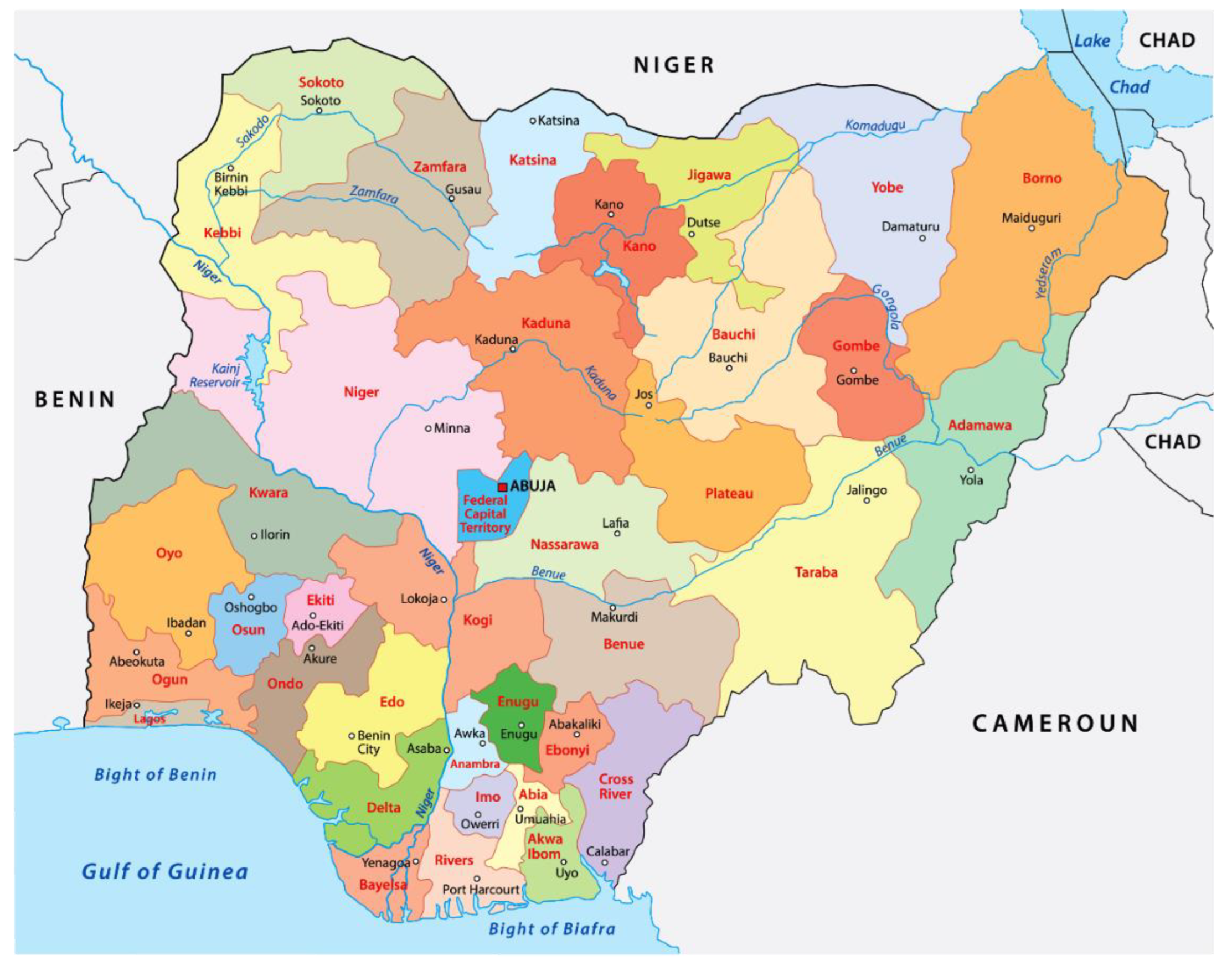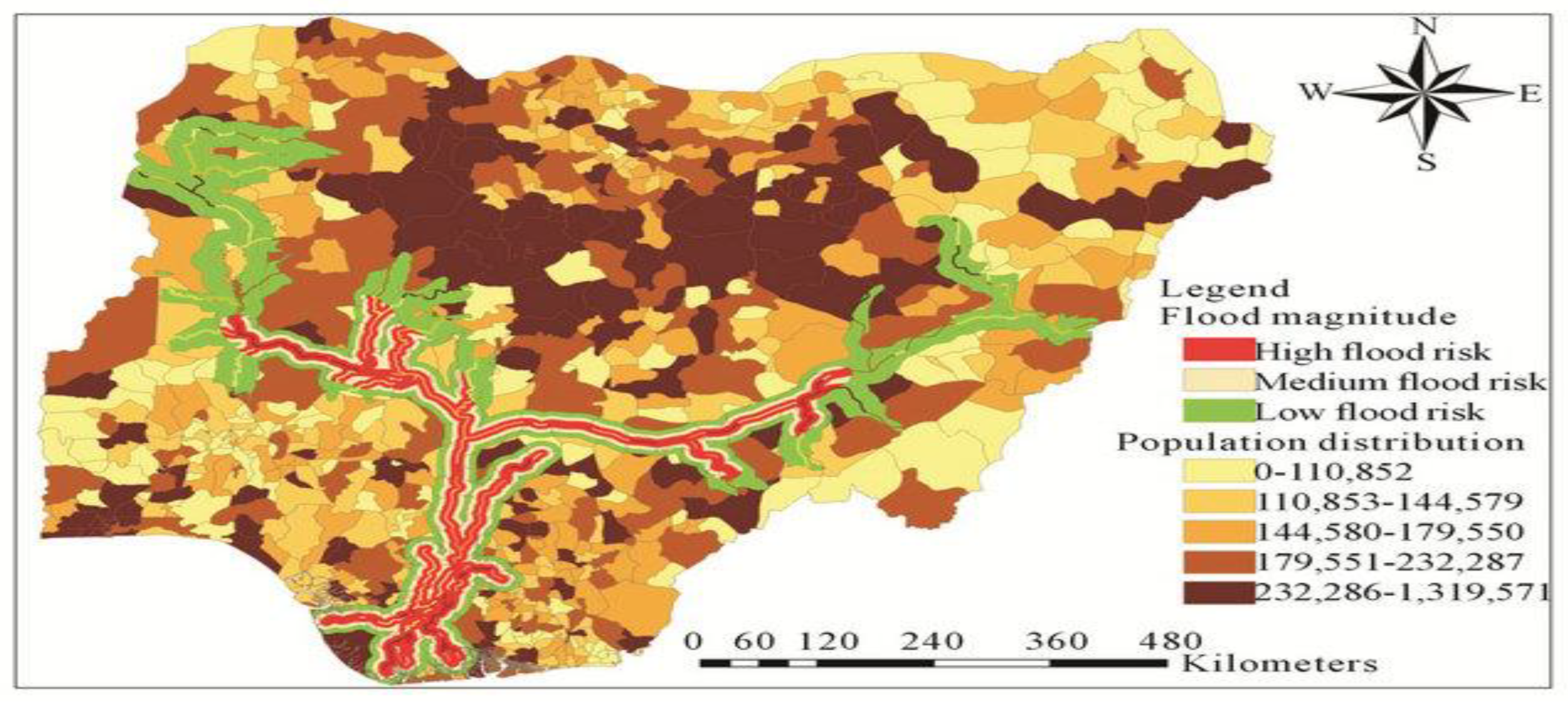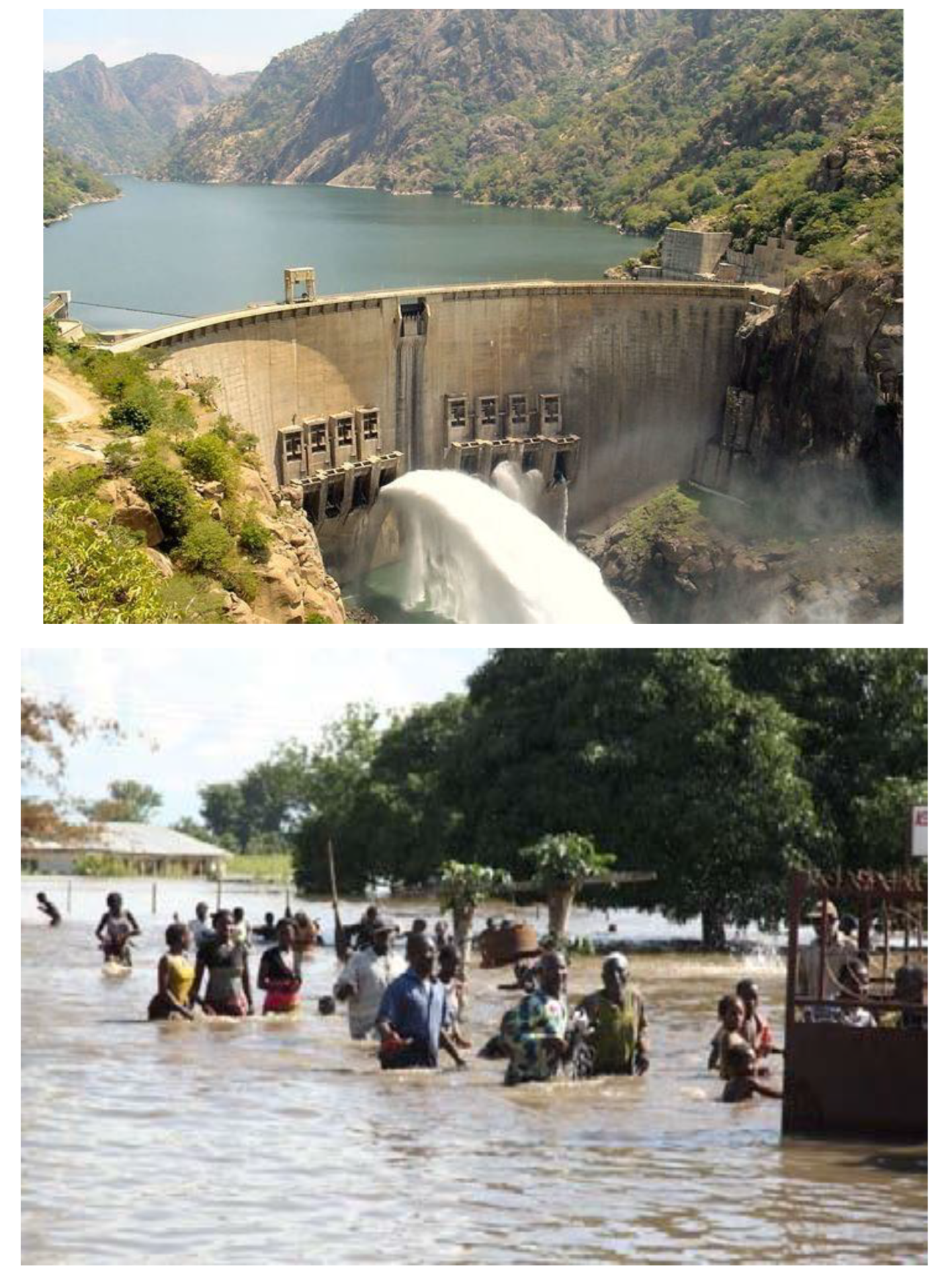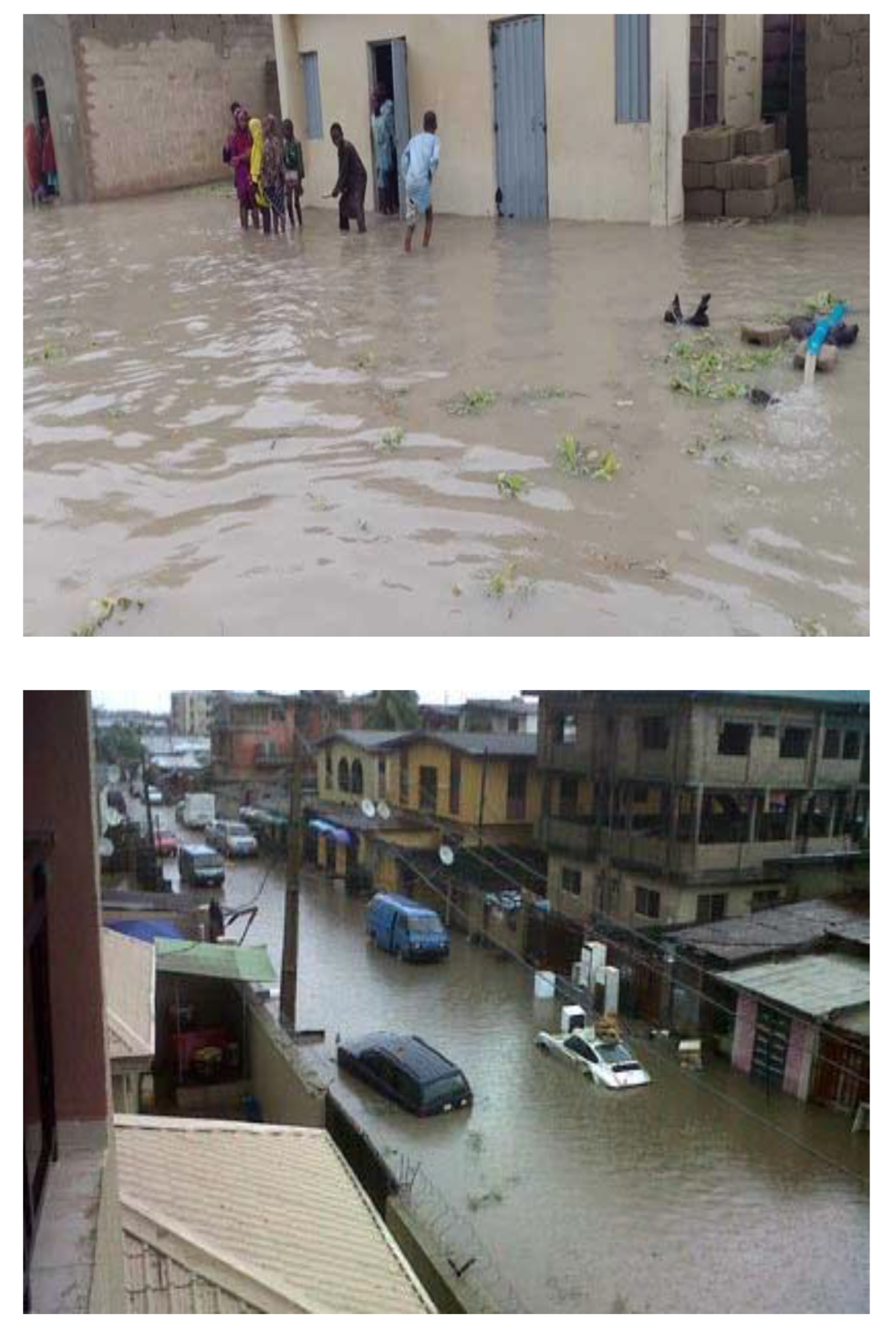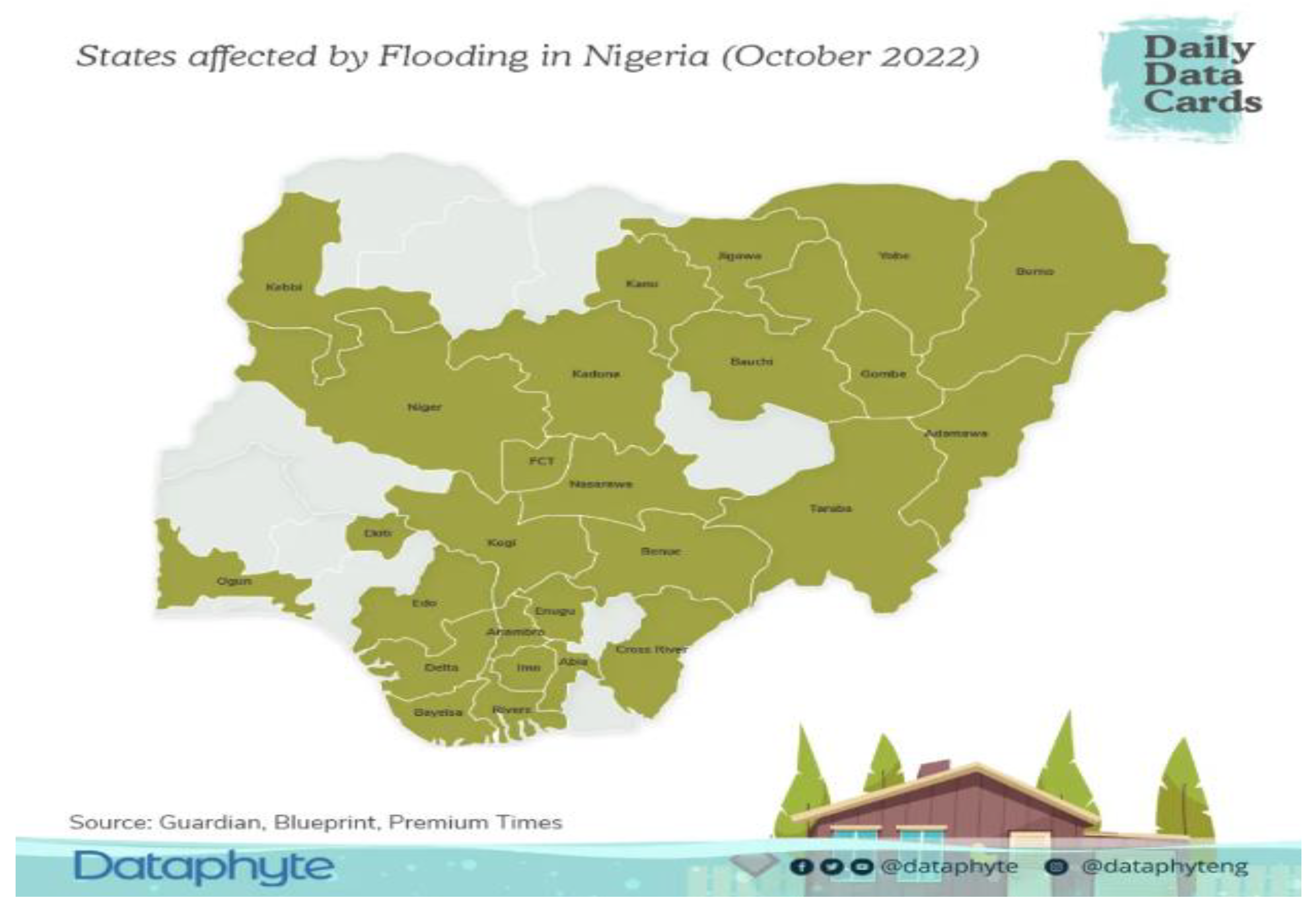Introduction
Flooding is a phenomenon that can occasionally have terrible consequences for people's quality of life. Due to fast population development, bad governance, deteriorating infrastructure, and a lack of effective environmental planning and management, the effects of flooding are especially severe in low-lying places. Climate change and a lack of preparation also increase flooding. However, as more people become aware of the risks it causes, flooding in most Nigerian cities remains a significant environmental issue that defies settlement. Recent flooding in Nigerian cities has had a variety of negative effects, including the loss of life and property, the spread of illness, and damaged infrastructure and assets.1 Flooding is both the most serious and the most common natural disaster across the planet. 47% of all disasters due to the weather are caused by floods.2 In the 20th century, floods claimed the lives of about 6.8 million people. According to statistics, 2.8 billion people have been impacted, with an average of around 80 million people affected annually over the world over the past 30 years.3,4 According to Doocy et al. (2013), the consequences include 4.5 million homeless people, 540,000 fatalities, 360,000 injuries, and millions of uncounted deaths.3,5
In many geopolitical regions of Nigeria, flooding is a common event and a common natural environmental threat. A variety of environmental hazards including floods, storms, droughts, desertification, landslides, wildfires, sandstorms, heat waves, disease outbreaks, pest infestations, soil erosion, ravine erosion, coastal erosion, other types of erosion, volcanic eruptions and related events occur occasionally in Nigeria, and establishing sustainable flood management has been a priority in public policy because the majority of communities lack of community services and infrastructures that are operational.6 In 2022, Nigeria has experienced its most devastating episode of seasonal flooding in a decade. A study acquired by the National Emergency Management Agency (NEMA) claims that 33 of Nigeria's 36 states have already experienced the floods expected in 2022, with many of the impacted areas highly dependent on agriculture for subsistence. Some areas of the country are now more susceptible to floods as a result of heavy rainfall and poor urban design.7 More than 600 people have died as a result, and 1.3 million people have lost their houses.8 A disruption in food supply in the most populous country in Africa is feared since hundreds of hectares of crops were also damaged by the calamity.9
The flood uprooted 1,554 agricultural villages in the 22 state-owned local government districts and damaged 138,442.36 hectares of farmland in Jigawa.In Nasarawa, 45,000 hectares of Olam rice farm in Rukubi Doma township have been washed away, costing over US$15 million, in addition to inundating smallholder farmland. Floods have caused severe economic and agricultural losses that will continue to test governments' efforts to ensure food and nutrition security.10, 11, 12 In contrast to the 2012 floods which caused more than 2.6 trillion naira in losses including farm products, the 2022 floods have yet to reach their terminal stage but farmers already face billions in losses as forecasts suggest the flood will last until the end of October.
Currently estimated to be 6 trillion in losses including agricultural produce, the 2022 floods have yet to reach their terminal stages but farmers are already counting billions of naira lost as forecasts suggest the floods will last even until the end of October becomes.13, 14, 15 Poor waste management, drainage system, urbanization blockage of flood pathways and drainage systems are one of the contributory factors of flooding in most of the cities around Nigeria.16 A thorough risk assessment not only determines the size and likelihood of prospective losses, but also fully explains the reasons behind and effects of such losses. In order to make decisions and formulate policies, it is essential that different facets of society work closely together. Therefore, building a Disaster Risk Profiling for Nigeria is necessary in order to fulfil the UNDP's work on disaster risk reduction (DRR) and recovery risk assessments. This risk profile aims to determine the ideal amount of catastrophe risk in Nigeria taking into account the needed risk, its risk capacity, and its risk tolerance.
Figure 1.
Map of Nigeria highlighting floods risk levels in the various states (Source: NIMET, September 2022).
Figure 1.
Map of Nigeria highlighting floods risk levels in the various states (Source: NIMET, September 2022).
Methodology
Study design
This study gathered information on flood disasters that have occurred in Nigeria. A secondary data was collected for the study purpose. The main focus of this study is around information on disaster risk, vulnerability, impacts, solution and frameworks.
Study location
Geography of Nigeria
Figure 2.
Map of Nigeria (WorldAtlas, 2023).
Figure 2.
Map of Nigeria (WorldAtlas, 2023).
Nigeria is a West African country surrounded by Chad and Cameroon to the east, the Republic of Benin to the west, and Niger to the north.17 The Niger and Benue River are the major rivers in Nigeria.18 Nigeria has a landmass of approximately 923,768 square kilometres (356,669 sq m) with about 218 million people live in Nigeria. It has 36 states, 774 Local Government Areas, and the Federal Capital Territory (FCT).17, 18, 19 Nigeria has around 250 distinct ethnic groups, with English serving as the official language in addition to three major indigenous languages (Yoruba, Ibo, and Hausa).17, 18, 19 Nigeria is a federal republic with two legislative chambers; the president acts as head of state and government. 17, 18, 19 The World Bank reported that Nigeria's Gross Domestic Product (GDP) was worth 440.78 billion US dollars in 2021. Nigeria's GDP value is equivalent to 0.05 percent of the global GDP.20 According to reports, this economic performance is exceptional compared to other global economies. Nigeria's current price-to-GDP ranking has risen from 2017 when it was ranked 32nd to 2022 when it was ranked 27th.21
Flood Risk Profile of Nigeria
Country risk profile
Figure 3.
The Index Risk Management Profile for Nigeria (Source: DRMKC-INFORM).
Figure 3.
The Index Risk Management Profile for Nigeria (Source: DRMKC-INFORM).
The Index for Risk Management (INFORM) Global Risk Index for Nigeria is 6.4 in 2022 placing the country in a high-risk category and was ranked 21st in Africa, for hazard and exposure was 7.3 and was ranked 17th. As for vulnerability, it was 5.8, ranking 29th position, in terms of lack of coping capacity to tackle disaster, the index was 6.3, placing the country in 37th position. The risk index for natural disaster was 4.1, floods and epidemics was ranked the highest natural hazard combating the country.22
Flood disaster in Nigeria
Like the rest of the world, Nigeria is subject to a wide spectrum of natural and man-made disasters. While some of these disasters happen quickly, others have a gradual development and result in catastrophic events that cause the loss of life and property as well as environmental degradation.23 Drought, desertification, flooding, diseases, coastal erosion, dam failure, building collapse, oil spillage, marine collisions or accidents, bomb blasts, collisions, fires, airline crashes, and boating accidents are just a few of the disasters that can happen.24 On a worldwide scale, natural disasters pose a severe concern. 68.5 million people were affected by natural disasters globally in 2018 alone, with 132 billion US dollars’ worth of losses were caused by an estimated mortality of over 11,000 persons.25 More than 11 million people in Nigeria have been impacted by flooding between 1985 and 2014, life with a total of 1100 fatalities and more than US$17 billion in physical damage.25
According to national authorities, more than 2.8 million people are being affected by the worst floods in a decade in Nigeria, which is currently experiencing its most severe bout of seasonal flooding in a decade. Over 600 people have died, and 1.3 million people have been displaced. Anambra, a state in southeast Nigeria, is most severely impacted. We have serious concerns about how the flooding would worsen the nation's already concerning food insecurity and malnutrition.26, 27, 28 Currently, more than 19 million people in Nigeria are suffering from extreme food insecurity, more than 440,000 hectares of cropland have been partially or completely destroyed. The Food and Agriculture Organization forecasts that this year's cereal output would likely be 3.4% lower than last year's due to floods, high production costs, and insecurity.26, 27, 28, 29
Figure 4.
Map showing the flood magnitude and population distributions (Source: Journal of Geographic Information System, DOI:10.4236/jgis.2013.52013).
Figure 4.
Map showing the flood magnitude and population distributions (Source: Journal of Geographic Information System, DOI:10.4236/jgis.2013.52013).
2022. Flooding in Nigeria and its causes
Many areas of Nigeria have been impacted by the floods that occurred there in 2022. Even though flooding occurs in Nigeria on occasion over the year, this year's floods were the worst since 2012. The release of water from the Lagdo Dam in neighbouring Cameroon, which started on September 13, as well as excessive rains, climate change, and other factors all contributed to the disaster. Early in the summer of 2022, flooding began, and it is projected to endure through November. Matthias Schmale, the UN's representative in Nigeria for humanitarian affairs, asserts that climate change is largely to blame for the floods.30
Figure 5.
The Lagdo Dam in Cameroon and Flooding in Adamawa (Source: Vanguard Newspaper, 13th February 2023).
Figure 5.
The Lagdo Dam in Cameroon and Flooding in Adamawa (Source: Vanguard Newspaper, 13th February 2023).
Figure 6.
Flooding in Jigawa and Lagos (Source: BBC News Pidgin, 13 October 2022).
Figure 6.
Flooding in Jigawa and Lagos (Source: BBC News Pidgin, 13 October 2022).
On September 13, flooding was made worse by the ongoing flow of water from the Lagdo Dam in neighbouring Cameroon. The River Benue and its tributaries are overflowed by extra water that is released from the dam, devastating villages in the north-eastern states of Kogi and Benue. When the Lagdo Dam was built in 1982, Nigerian officials agreed to construct a second, twin dam in Adamawa State to hold back the overflows. The Dasin Hausa Dam project, also known as, was never completed by the Nigerian government. It was meant to be in Dasin Village, under the control of the Fufore local government. Local governments, states, and communities, according to Nigeria's minister of humanitarian affairs, disaster management, and social development Sadiya Umar Farouq, had adequate notice and knowledge about the 2022 flood. She blamed them for failing to take prompt action despite the warnings.30
Channels get clogged with garbage due to indiscriminate development on flood plains and storm water pathways in many residential areas and poor drainage systems. Environmental laws that are not strictly enforced have only made matters worse.30 Travellers passing through towns are regrettably need to take longer paths to their destinations. Several highways have been washed away, and numerous farmlands, homes, cars, and other things have fallen victim to flooding's devastating effects.31
Impacts of 2022 flooding in Nigeria
33 of Nigeria's 36 states have been impacted by flooding.32 The floods has had an impact on more than two million people. Over 2,400 people had been hurt as of October, while over 600 people had died. On October 7, a boat transporting people fleeing the flooding capsized, causing 76 people to perish on the Niger River.30, 32 There had been 372 fatalities by August. Since May 2022, more than 1,000 cases of cholera have been documented in the states of Borno, Adamawa, and Yobe. At least 64 people have died as a result of a cholera outbreak in north-eastern Nigeria that was caused by floods that contaminated water supplies.32 As of October, more than 200,000 dwellings have been fully or partially damaged by the floods.30, 32 Many Nigerians who reside in flood plains are unable to relocate and must instead stay in their homes till water levels return to normal following the yearly floods. A further estimated 110,000 hectares of agricultural land have been ruined by flooding. The floods have also affected fuel deliveries. Food cost increases during the crisis have reached 23%.30, 32
According to predictions made by the World Food Programme and the Food and Agriculture Organization of the United Nations, Nigeria may likely to face extreme levels of hunger. Matthias Schmale, the UN humanitarian coordinator for Nigeria, stated in a briefing on October 13 that 14.7 million children in Nigeria were at danger of malnutrition and 19 million people in Nigeria experienced food insecurity.30, 32 In the north and north-east of the nation, 400,000 kids were at danger for severe acute malnutrition, and 500,000 more were in the north-western states of Sokoto, Zamfara, and Katsina. Anambra, Delta, Rivers, Cross River, and Bayelsa are among the southern states where flooding is anticipated to last into November. Kainji, Jebba, and Shiroro, three reservoirs in Nigeria, are anticipated to flood.30, 32
Figure 7.
Map of Nigeria showing impacts of 2022 flooding across Nigeria (Source: Guardian Blueprint Premium Times, 2022).
Figure 7.
Map of Nigeria showing impacts of 2022 flooding across Nigeria (Source: Guardian Blueprint Premium Times, 2022).
General impacts of flooding
Flood damage might be severe, only 0.2% to 2% of flood victims need medical attention.33 Impacts of flooding may include.
Damage to infrastructures and properties
Outbreak of food and waterborne infection (e.g. cholera)
Contact with polluted drinking and washing water as well as inadequate sanitation
Consumption of hazardous food
Heavy downpours and flooding create new habitats for animals and insects, such as stagnant pools and moist places.
Prolonged exposure of flood victims to mold and mildew can lead to upper respiratory illnesses and the onset of cold-like symptoms, especially in individuals who have allergies and asthma.
Poisoning by carbon monoxide
Displacement of people
Loss of human and animal lives
Destruction of farmland and crops
Loss of livelihood
Decreased in purchasing power
Deterioration of health conditions
It can lead to trauma in the affected individuals
Damage of the ecosystem
It can increase crime, sexual abuse and violence
It increases the chances of school drop-out
It can lead to food inflation
It may increase infant morbidity and mortality
Vulnerability of flooding
Everyone living in the flood-prone areas are vulnerable to flooding hazards. Children and teenagers living in flood-affected areas are particularly at risk. In addition to emotional and psychological suffering, they are more vulnerable to water-borne infections and other health conditions.
Risk mitigation techniques
Bariweni et al 34 recommended several methods for reducing risk, including but not limited to:
-
Danger mapping identifies the region that is at risk and should serve as the foundation for all initiatives aimed at reducing flood damage.
Raising awareness of flood-prone locations among the general population
Perform spatial planning and land management, which provide a variety of tools to prevent natural hazards
Providing information about at-risk locations by identifying flood risk zones.
Terracing hillsides to reduce runoff from hills
Planting vegetation to store more water
Construction of levees, dikes, dams, reservoirs, or retention ponds to hold additional water is another method
The creation of flood ways (man-made pathways to divert floodwater)
Discussion
Nigeria experiences flooding every year. Over 2.5 million people have been affected by the recent spate of flooding, of whom 1.3 million have been forced to relocate, 2,407 have been injured, and 603 have died across 25 states that have been particularly hard hit by the natural disaster. The country has been counting losses since early October. Due to the severity of the flood compared to the 2012 flooding, it was declared to be the worst of its sort in the previous decades.
In Nigeria, flooding has thus far been downplayed in terms of its socio-political implications and, if at all, only the economic costs have been highlighted. It has been portrayed as an isolated environmental problem brought on by climate change. Flooding's repercussions, which are multifaceted and have the potential to affect the Nigerian elections in 2023, go beyond only escalating economic problems. Flooding has become more common in regions of the country as a result of heavy rainfall, poor urban planning, climate change and other predisposing factors.
Conclusion
Nigeria experiences flooding every year, but the negative effects can be reduced with good management. This study looked on the recent flooding in Nigeria. Several issues and challenges were highlighted. While floods have become more common in Nigeria in recent years, raising awareness and speeding up flood risk management efforts, there has been a general lack of coordination and integration across various critical FRM systems and procedures. FRM strategy and reactions have usually focused on sub-regional or sub-sectorial optimization. There is a lack of a comprehensive or systemic approach to urban system planning and development. Because FRM systems are improperly segregated from other built-environment subsystems, they are inefficient and ineffectual.
Despite significant investment in a variety of structural FRM programmes, these technologies have not been adequately adapted to the socio-technical environment in Nigeria, nor has the requisite knowledge been transmitted to Nigerian specialists. Amid the nation's progress in implementing HFA 2005-2015, it deems it necessary to provide committed funds for Disaster risk reduction actions at all levels for disaster preparedness, response, and recovery; and additionally ensure that DRR is incorporated into policies, plans, and programmes in disaster preparedness, response, and rehabilitation in order to address risk reduction for disasters and disaster enhancing resilience with such a renewed sense of urgency.
Recommendations
There are various socio-cultural aspects, as well as techno-economic and development potential that enable the adoption of sustainable, integrated FRM systems in Nigeria infrastructural development techniques at a reduced cost. These opportunities can be fully realized if a framework for analyzing the linkages between the urban development process and the FRM system in Nigeria exists. As a result, the following recommendations for practice and further research are thought to be valuable.
Policy and practice
Adoption of practical actions for the development and incorporation of appropriate flood risk management concepts and practices within the nation's educational curricula.
Increasing the number of entrepreneurs involved in the development and execution of flood risk management solutions in Nigeria.
Implementing a comprehensive approach to urban infrastructural projects.
Evaluation of ongoing and proposed infrastructure initiatives with the goal of optimizing flood risk management competences while still reaching their intended goals.
Establishment of a flood management research and capacity development centre to act as a multidisciplinary platform for formulating effective strategic policies and operational mechanisms for flood risk management in Nigeria.
Additional investigation
Assessment of past and continuing flood risk management efforts in Nigeria. This necessitates the creation of flood risk management performance evaluation models.
Creation of an evaluation framework to optimize the deployment of technology for flood risk management measures such as rainwater/floodwater harvesting, pumped hydro power systems, and transit canals.
Creation of low-cost, user-friendly flood risk assessment systems for both individual properties and communities.
Analysis of flood risk management knowledge/skills gaps across several key professions to identify human capacity requirements for long-term flood risk management.
References
- Odufuwa Bashir O, Adedeji Oludare H, Oladesu Johnson O. Floods of fury in Nigerian cities. J Sustain Dev. 2012;5(7):69. [CrossRef]
- UNISDR. The human cost of weather-related disasters 1995-2015. Available from: https://www.unisdr.org/we/inform/publications/46796.
- Vishwanath VH, Tomaszewski BM. Flood Hazard, Vulnerability, Risk Assessment for Uttarakhand State in India. In ISCRAM 2018.
- Bhatt, Ganesh D., Sinha, Komal, Deka, P. K., Kumar, Ajay (2014) Flood Hazard and Risk Assessment in Chamoli District, Uttarakhand Using Satellite Remote Sensing and GIS Techniques, International Journal of Innovative Research in Science, Engineering and Technology, 3, 8, 15348 - 15356. [CrossRef]
- Doocy, Shannon, Daniels, Amy, Murray, Sarah, Kirsch, Thomas D. (2013) The Human Impact of Floods: A Historical Review of Events 1980-2009 and Systematic Literature Review. PLOS Currents Disasters. [CrossRef]
- Oyebode OJ. Hazard assessment and implementation strategies for mitigating of flood and erosion in Nigeria. InIOP Conference Series: Materials Science and Engineering 2021 Mar 1 (Vol. 1036, No. 1, p. 012066). IOP Publishing.
- Nigeria’s IMF GDP Ranking Improves but Grave Socio-Economic Challenges Overshadows Growth. Available from: https://www.dataphyte.com/latest-reports/economy/nigerias-imf-gdp-ranking-has-improved-but-grave-socio-economic-challenges-overshadows-growth/.
- UNISDR. Global Assessment Report on Disaster Risk Reduction 2013. Available from: http://www.unisdr.org/we/inform/publications/33013.
- World Economic Forum (2022). Nigeria's worst floods in a decade have displaced over a million people. Available from: https://www.weforum.org/agenda/2022/10/nigeria-flood-rain-climate.
- Nigeria battling floods ‘beyond control’ as warning given of dams overflowing. Available from: https://www.theguardian.com/world/2022/sep/19/nigeria-battling-worst-floods-in-a-decade-with-more-than-300-people-killed-in-2022.
- Farmers Count Losses As 2022 Floods Impede Nigeria’s Food Security Drive. Available from: https://leadership.ng/farmers-count-losses-as-2022-floods-impede-nigerias-food-security-drive/.
- Nigeria - Farmers count losses as 2022 floods impede food security drive. Available from: https://agroinsurance.com/en/News/Nigeria---Farmers-count-.
- Omoge Adeyemi O, Abraham Frank U, Adekale Temitope A, Adesegun Mobolaji M, Coursin Oluwapelumi O, Odide Clement E. Assessment of Solid Waste Management Practices among Residents of Buari Ishola Isibo in Ede North Local Government Area, Osun State, Nigeria. Pollution3 (2021) : 964.
- WHO/EHA Panafrican Emergency Training Centre, Addis Ababa Updated March 2002 by EHA Disaster & Emergency. Available from: https://apps.who.int/disasters/repo/7656.pdf. 20 March.
- United Nations International Strategy for Disaster Risk Reduction (UNISDR). Terminology on Disaster Risk Reduction (2009). Available from: http://www.unisdr.org/files/7817_UNISDRTerminologyEnglish.pdf.
- United Nations Office for Disaster Risk Reduction (UNDRR). Disaster. Availablefrom: https://www.undrr.org/terminology/disaster.
- Geography of Nigeria. Available from: https://en.wikipedia.org/wiki/Geography_of_Nigeria.
- Nigeria. Available from: https://www.nationsonline.org/oneworld/nigeria.htm.
- Nigeria summary: A brief overview and history of Nigeria. Available from: https://www.britannica.com/place/Nigeria.
- Worldomoeter. 2022 (Nigeria Population). Available from: https://www.worldometers.info/world-population/nigeria-population/.
- Trading Economics. Nigeria GDP. Available from: https://tradingeconomics.com/nigeria/gdp.
- Office for Outer Space Affairs UN-SPIDER Knowledge Portal. Flood. Available from: https://www.un-spider.org/flood.
- Office of the Queensland Chief Scientist. What is a flood? Available from: https://www.chiefscientist.qld.gov.au/publications/understanding-floods/what-is-a-flood.
- PreventionWeb (National Disaster Framework: Understanding The Framework). Available from: https://www.preventionweb.net/files/21708_nigherianationaldisastermanagementf.pdf.
- Center for Research on the Epidemiology of Disasters (CRED) (2020). EM-DAT database. Available from: https://public.emdat.be.
- UNISDR. Global Assessment Report on Disaster Risk Reduction 2013. Retrieved from: http://www.unisdr.org/we/inform/publications/33013.
- World Economic Forum (2022). Nigeria's worst floods in a decade have displaced over a million people. Retrieved from: https://www.weforum.org/agenda/2022/10/nigeria-flood-rain-climate.
- Nigeria - Floods (NiMet, media) (ECHO Daily Flash of 12 July 2022). Available from: https://reliefweb.int/report/nigeria/nigeria-floods-nimet-media-echo-daily-flash-12-july-2022. 12 July.
- DRMKC-INFORM. Nigeria. Available from: https://drmkc.jrc.ec.europa.eu/inform-index/INFORM-Risk/Country-Risk-Profile.
- 2022 Nigeria Flood. Available from: https://en.wikipedia.org/wiki/2022_Nigeria_floods.
- Quick Facts about Cameroon’s Lagdo Dam Causing Floods in Nigeria. Available from: https://thenigerialawyer.com/quick-facts-about-cameroons-lagdo-dam-causing-floods-in-nigeria/.
- ACAPS Briefing Note - Nigeria: Country-wide flooding (21 October 2022) – Nigeria Available from: https://reliefweb.int/report/nigeria/acaps-briefing-note-nigeria-country-wide-flooding-21-october-2022. 21 October.
- Zibulewsky J. Defining disaster: the emergency department perspective. Proceedings (Baylor University Medical Center). 2001; 14(2):144-149. [CrossRef]
|
Disclaimer/Publisher’s Note: The statements, opinions and data contained in all publications are solely those of the individual author(s) and contributor(s) and not of MDPI and/or the editor(s). MDPI and/or the editor(s) disclaim responsibility for any injury to people or property resulting from any ideas, methods, instructions or products referred to in the content. |
© 2023 by the authors. Licensee MDPI, Basel, Switzerland. This article is an open access article distributed under the terms and conditions of the Creative Commons Attribution (CC BY) license (http://creativecommons.org/licenses/by/4.0/).

